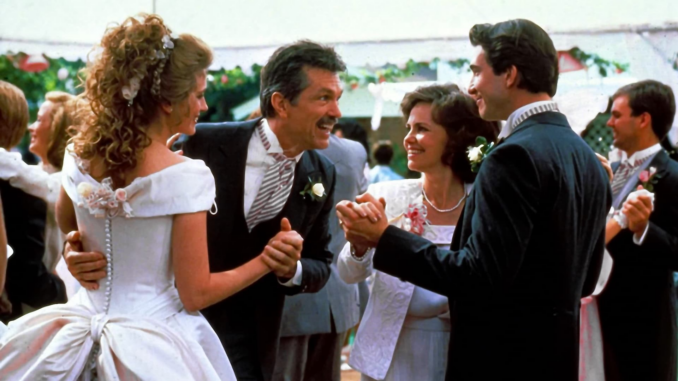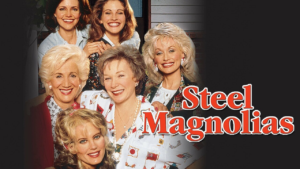
Julia Roberts’ co-star remembers her being mistreated by the director on the set of Steel Magnolias. Directed by Herbert Ross, based on the 1987 play and adapted to the screen by Robert Harling, the 1989 film follows the close-knit bond between a group of women in a small Southern town and how they navigate the loss of one of their own. The movie stars Julia Roberts, Sally Field, Dolly Parton, Shirley MacLaine, Daryl Hannah, Olympia Dukakis, Tom Skerritt, Dylan McDermott, Kevin J. O’Connor, and Sam Shepard.
In her new memoir The Wall of Life (via Variety), Shirley MacLaine remembered Julia Roberts being mistreated by director Herbert Ross on the set of Steel Magnolias. She says the director mistreated and was unfair to Roberts, and seemed threatened by her talent and beauty. Eventually, the rest of the cast collectively urged the director to stop his mistreatment of the young actress. Read MacLaine’s full comments below:
He did not treat her well, and he was so unfair to her. Everyone else could see how talented and beautiful she was, so we didn’t take it too well. She seemed to threaten Herb Ross’ sense of power. We told him to knock it off and to leave her alone.
What Shirley MacLaine’s Comments Mean For Julia Roberts’ Mistreatment On Steel Magnolias
They Corroborate Sally Field’s Recent Comments
Earlier this year, Sally Field also opened up about director Herbert Ross’ mistreatment of Julia Roberts while filming Steel Magnolias. In an interview, Field said the director was “very, very, very hard on Julia. If you ever talk to Julia, she’ll tell you.” Field continues, describing how the cast coalesced around the young Roberts, “We would all rally around Julia, because she was the baby. She was sort of the newcomer. And she was wonderful, and he just picked on her. It was awful.”Field doesn’t see a particular reason why Roberts was mistreated, other than the director was “a real son of a bitch” and “some people just need to have somebody they pick on.” Field says it was Dolly Parton who first turned on the director, “always with humor, but usually the most vulgar humor you ever heard so that it was like, you just literally don’t have a leg to stand on.” Field says she doesn’t “mind notes” as an actor, but what the director did to Roberts was just plain “mean.”

Our Take On Julia Roberts’ Mistreatment On Steel MagnoliasThere is an inherent power imbalance between directors and actors on film sets, and nowhere is that more apparent than on Steel Magnolias. At the time, Ross was known for directing 1977’s The Turning Point, receiving Academy Award nominations for Best Director and Best Picture, and afterward, he went on to direct a big-box office success in 1984’s Footloose. On the other hand, 1989’s Steel Magnolias was one of Roberts’ first credits, though she quickly made a name for herself by earning the first Oscar nomination of her career, signaling to future collaborators that she shouldn’t be messed with.Read More About Steel Magnolias
Julia Roberts’ Performance Still Stands OutFor his stage play, Steel Magnolias, Robert Harling drew significant inspiration for the story from his sister, Susan Harling Robinson, who passed away in 1985 due to complications from type 1 diabetes. The play first premiered Off-Broadway in 1987 before he adapted it into a feature film in 1989. In the movie, Julia Roberts plays Shelby, the character based on Susan. Steel Magnolias premiered to mixed reviews, though Roberts’ performance was widely praised, earning her first Oscar nomination.
Over 30 years later, Steel Magnolias still stands as an early testament to Julia Roberts’ talent.Steel Magnolias reviews represent a mix of praise and critique, noting its blend of humor and emotional depth. Many praise the strong ensemble cast, especially standout performances from Sally Field, Shirley MacLaine, and Roberts – who bring charm and warmth to their roles. While some critics feel the film balances humor and heartfelt moments well, others argue that it overuses sentimentality and loses intimacy in its cinematic adaptation, occasionally leaning into superficial or exaggerated performances. With an abundance of comedy and lively characters, Steel Magnolias arguably becomes more powerful and impactful when it leans into full melodrama at the end.Upon its release in 1989, Steel Magnolias was also a big box office success, grossing over six times its $15 million budget for a worldwide total of $96.8 million. The movie was also released on VHS in 1990 and DVD in 2000, allowing it to gross an additional $40 million, bringing its total gross to $135 million. Over the years, there have been numerous attempts to adapt Robert Harling’s stage play to different mediums and recapture this success, including a 1990 CBS sitcom pilot set after the events of the film and a 2012 Lifetime remake featuring an all-black cast.
